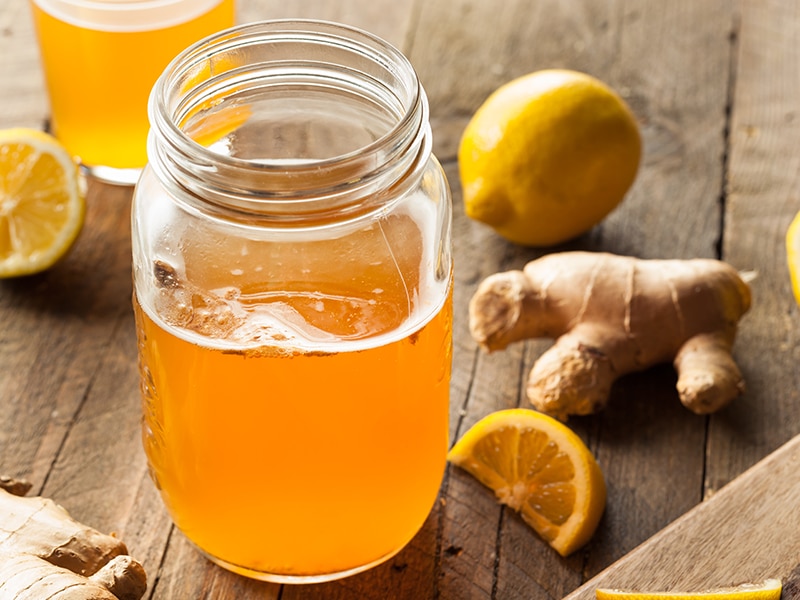Kombucha is praised by many for its gut health benefits, but is it really as healthy as you think?
What exactly is kombucha?
Kombucha is made from a mixture of three ingredients: tea, sugar, and a SCOBY, which stands for symbiotic culture of bacteria and yeast. Don’t let the word bacteria scare you, as the funky tea fungus has an important job.
The SCOBY begins the fermentation process, by breaking down the sugar into carbon dioxide and alcohol and then converts the alcohol to acetic acid. This gives the drink a sweet and tangy taste. Oftentimes, fruit juice and extracts are later added for flavor. Basically, it is an acidic non-alcoholic fermented drink. The health benefits are believed to be linked to the acidic property of the food which can limit growth of some bacteria and even have antimicrobial effects.
Investigating the health claims
Most of what we hear about the benefits of kombucha is by word-of-mouth.
“There just isn’t enough research to back the health claims,” says Veena Kumaravel, MD, gastroenterologist on the medical staff at Methodist Richardson Medical Center. “We may see more studies in the future, but for now it’s difficult to say if kombucha is good for your gut.”
Determining fact or fiction from health claims starts with information. Let’s explore some of the top health claims:
1. Kombucha is a great source of probiotics.
Fact: Kombucha contains some probiotics for a healthy gut, but it’s difficult to tell how much. “We don’t always have accurate information on the amount of microbes in commercial products,” Dr. Kumaravel says. “It’s even more difficult to tell how much is in a home-brew.”
If you’d like to include probiotics in your diet, Dr. Kumaravel recommends cultured milk products such as yogurt or kefir (fermented milk drink), sourdough, or sauerkraut.
2. Kombucha has antimicrobial properties.
Fact: Kombucha could have some antimicrobial effects. Antimicrobial agents prevent or fight against harmful bacteria growths that could lead to disease. Some studies have shown antimicrobial properties, but more research is needed.
“Not only that,” Dr. Kumaravel says. “If made incorrectly, kombucha can be easily contaminated with harmful bacteria and have toxic effects.”
3. Kombucha can cure cancer, AIDS, and heart disease.
Fact: Most studies that claim kombucha is a cure-all have used animals as test subjects, not humans. For stronger evidence of the benefits of kombucha, we need more controlled and randomized studies on humans.
The jury’s still out
If you experience good results or enjoy the fizzy taste, continue to drink with caution. Just don’t expect a miracle. Dr. Kumaravel recommends taking care of your gut in other ways and avoiding popular quick fixes.
“To improve your gut health, make sure to eat enough fiber, follow a balanced diet, limit use of antibiotics when possible, and watch your portion sizes. Always remember to be cautious of claims that seem too good to be true,” Dr. Kumaravel says.
Tips for a Safer Brew
Making kombucha at home may save a little cash, but could make you sick if brewed incorrectly. Follow these tips to make sure your brew is safe to drink:
- Choose a healthy SCOBY.
A healthy SCOBY is light in color and should have no mold growth. Purchase your SCOBY cultures from a trusted source. Never share a SCOBY.
- Use glass containers and clean utensils.
Avoid fermenting in metal, stainless cups, lead crystal or ceramic containers, in case of lead leakage, and always use clean utensils to avoid cross contamination.
- Ferment for 7–10 days at room temperature.
Overfermentation may cause your tea to become too acidic.
- Keep the pH level between 2.5–3.5.
Harmful microorganisms can grow in tea with a pH more than 4.2. Consistently track the pH levels of your brew.
- Refrigerate in tightly covered container.
Keeping kombucha at room temperature will continue the fermentation process and may result in carbon dioxide buildup or mold growth. To maintain the quality of your brew, keep it cold and covered.

